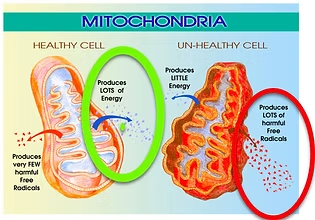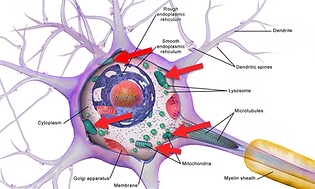First, let’s decode this compelling mystery that’s knocking on your health’s door. How about an intriguing question? Have you ever imagined how your overall well-being might skyrocket if your cells were in prime condition?
Let’s unfold the science and take you down to a world you rarely consider – the cellular level. Let’s explore the critical role of your body’s cellular powerhouses, the mitochondria. Astonishingly, these energy-generating structures can take up an impressive 25% of your cell’s volume.
Get this: each cell in your body houses approximately 1000 to 2500 mitochondria. Yes, each cell! That’s why the vitality of your mitochondria is integral to your overall health. It’s not just important – it’s indispensable.
Mitochondria and Your Nervous System: A Crucial Connection
Now, let’s unravel this concept a bit further. This time, through the lens of an image. Imagine gazing at a nerve cell, crowded with red arrows pointing at mitochondria. Here’s the catch. What if these mitochondria are not in their best shape? How do unhealthy mitochondria affect your nervous system?
If your brain and peripheral nervous system are bustling with unhealthy mitochondria, they might be hosting an unwanted guest – an array of unsettling symptoms. These could range from brain fog and mental fatigue to mild cognitive impairment. Picture living with a perpetual sense of malaise, never feeling quite up to the mark. That’s the predicament when your nervous system is teeming with unhealthy mitochondria. This paints a compelling picture of why your mitochondria’s health is so paramount.
Healthy Vs. Unhealthy Mitochondria: The Stark Contrast
The story unfolds further. Imagine a pair of contrasting images. One is a vibrant, healthy mitochondrion, brimming with ATP (adenosine triphosphate) – your body’s energy currency. Encircled in green, this mitochondrion is a power factory, churning out abundant energy.
Now, cast your glance at the other end of the spectrum. Here lies a mitochondrion under siege, riddled with oxidative stress, and barely holding on. In a stark red circle, this mitochondrion struggles, producing a multitude of harmful free radicals instead of energy.
Translate this scenario into your life. Unhealthy mitochondria mean inadequate ATP. Inadequate ATP equates to less energy for you. The equation is simple but profound: sick mitochondria equals a not-so-healthy you.
The Takeaway Message
If you found value in this journey of unraveling the importance of mitochondrial health, feel free to like, comment, share, and spread this knowledge with your loved ones. After all, health is wealth, and sharing vital information could be the key to unlocking a healthier and happier life for someone you care about.
Frequently Asked Questions (FAQ)
Mitochondria are the powerhouses of your cells, responsible for generating energy (in the form of ATP). Astonishingly, they can occupy up to 25% of a cell's volume, with each cell containing 1,000 to 2,500 mitochondria. Their health is indispensable because they provide the essential energy every cell in your body needs to function properly. Simply put, healthy mitochondria are fundamental to your overall well-being.
When the mitochondria in your brain and peripheral nervous system are unhealthy, they cannot produce sufficient energy. This energy deficit can manifest as a range of neurological symptoms, including brain fog, mental fatigue, mild cognitive impairment, and a persistent feeling of malaise. Your nervous system is highly energy-dependent, so mitochondrial health is directly linked to its optimal function.
A healthy mitochondrion is a vibrant power factory, efficiently producing abundant ATP (your body's energy currency). In contrast, an unhealthy mitochondrion is under siege by oxidative stress. It struggles to function and instead of producing energy, it generates a multitude of harmful free radicals, which can cause further damage to your cells.
The equation is simple but profound: sick mitochondria equal a less healthy you. When your mitochondria are unhealthy, they produce inadequate ATP. Since ATP is the fundamental currency of energy for every process in your body, this results in overall low energy levels, fatigue, and a general decline in vitality.
This post serves as an introduction to the critical role of mitochondria. The key takeaway is the profound impact mitochondrial function has on your energy and nervous system. For specific strategies on improving mitochondrial health through diet, lifestyle, or supplements, it is recommended to consult with a healthcare professional trained in functional medicine who can provide personalized advice.










